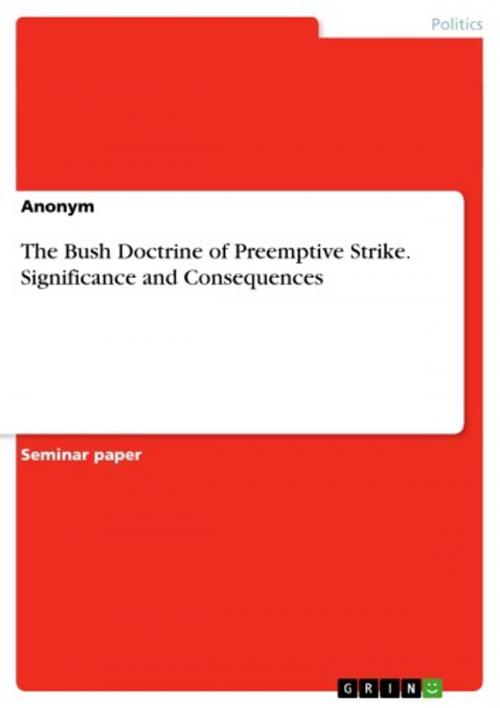The Bush Doctrine of Preemptive Strike. Significance and Consequences
Nonfiction, Social & Cultural Studies, Political Science| Author: | Anonymous | ISBN: | 9783640664566 |
| Publisher: | GRIN Publishing | Publication: | July 19, 2010 |
| Imprint: | GRIN Publishing | Language: | English |
| Author: | Anonymous |
| ISBN: | 9783640664566 |
| Publisher: | GRIN Publishing |
| Publication: | July 19, 2010 |
| Imprint: | GRIN Publishing |
| Language: | English |
Seminar paper from the year 2005 in the subject Politics - International Politics - Region: USA, grade: 2,3, Free University of Berlin, language: English, abstract: With the release of the National Security Strategy (NSS) in September 2002, the administration of President George W. Bush developed the ideological keystone for U.S. foreign policy for the beginning of the 21st century. The document is therefore often referred to as the Bush Doctrine. Its publication, and more so, its application in the American foreign policy agenda, has caused tensions among politicians, diplomats and citizens all around the globe. The consequences, however, may be more consequential than just a temporary low in the international political climate. The Bush Doctrine '[...] affirms the legitimacy of an American preventive strike and emphasizes the notion that 'If you are not with us, you are against us.' U.S. foreign policy, therefore, is [...] about shedding the multilateralism favored by the Clinton administration and pursuing a more active, unilateral approach' (Glazov 2002, 1). In the following, I intend to analyze what consequences the U.S. foreign policy issued in the 2002 NSS has on America itself and on the international community in general In particular, I will deal with the definition of prevention and preemption and the Administration's unilateral approach towards global politics. As both friends and enemies evaluate the meaning of the 2002 NSS, it becomes evident that great danger might lie in the ambiguous wording of the Doctrine. The question is now, whether it will prove to be a sound and effective strategy in the War on Terror or continue to disunite America and its allies, if its content is not properly clarified and addressed
Seminar paper from the year 2005 in the subject Politics - International Politics - Region: USA, grade: 2,3, Free University of Berlin, language: English, abstract: With the release of the National Security Strategy (NSS) in September 2002, the administration of President George W. Bush developed the ideological keystone for U.S. foreign policy for the beginning of the 21st century. The document is therefore often referred to as the Bush Doctrine. Its publication, and more so, its application in the American foreign policy agenda, has caused tensions among politicians, diplomats and citizens all around the globe. The consequences, however, may be more consequential than just a temporary low in the international political climate. The Bush Doctrine '[...] affirms the legitimacy of an American preventive strike and emphasizes the notion that 'If you are not with us, you are against us.' U.S. foreign policy, therefore, is [...] about shedding the multilateralism favored by the Clinton administration and pursuing a more active, unilateral approach' (Glazov 2002, 1). In the following, I intend to analyze what consequences the U.S. foreign policy issued in the 2002 NSS has on America itself and on the international community in general In particular, I will deal with the definition of prevention and preemption and the Administration's unilateral approach towards global politics. As both friends and enemies evaluate the meaning of the 2002 NSS, it becomes evident that great danger might lie in the ambiguous wording of the Doctrine. The question is now, whether it will prove to be a sound and effective strategy in the War on Terror or continue to disunite America and its allies, if its content is not properly clarified and addressed















